- Home
- Neal Shusterman
Shattered Sky Page 14
Shattered Sky Read online
Page 14
So dazed was the security officer that he never stopped to wonder what a seventy-year-old man was doing rolling across this particular intersection at this ungodly time of night.
IT WAS ALMOST TOO much for Dillon’s system to take.
The massive loss of blood, the violent rending of his sinus cavity. Maddy’s final bullet had entered through his left cheek, and exited through his right, shattering his teeth and jaw in between. The effect had been bloody, and destructive enough to make Bussard believe the bullet had entered his brain. But apparently Maddy knew her anatomy, and the only injury to Dillon’s brain was the concussion from the blast. The bullet never came close. He understood now that there was no other course of action that would save him. No other place she could shoot would have fooled Bussard—but these awful wounds were not like any wounds he had ever suffered. His experience had been with gashes that zipped themselves closed in a matter of seconds and broken bones that set themselves in a matter of minutes. But the shock to his organs and nervous system was too great for even his reparative spirit to remedy. Healing would take hours, maybe days, if he could reconstruct his body at all.
Crumpled in the passenger seat of the delivery truck, he slipped in and out of consciousness, feeling every lane change, every bump in the road like a fresh wound. The rain pelted the windshield and he couldn’t tell the beat of his heart from the beat of the wiper blades. Were they being closely pursued, or had they left so much confusion in their wake that they were able to get a sizeable head start? He had no idea. The outside world was still screaming at him, as it had from the moment he stepped out of his cell, but his own dopamine release drugged him into not caring.
“You’ll be all right, won’t you?” he heard Maddy ask. “Your face is looking better already, isn’t it?” She sounded so uncertain. She wanted some corroboration from him that she hadn’t gone too far. It hurt too much to move his jaw, so he reached over and squeezed her hand. She did what she had to do, Dillon thought. Any more, he would have died on the spot, any less, and Bussard would not have been duped. A trapped animal would gnaw off its foot to escape from the jaws of a spring-trap. This is what Maddy had done for him, and sacrificed her career to do it.
Some time later, he was dimly aware of being moved through the rain from the truck to another car that Maddy must have hot-wired. Then, once they were moving again, Dillon allowed himself to let go of his shaky grip on consciousness, not knowing whether it was death or sleep that pulled him down.
WHAT DID HE DO TO ME what did he do to me what did he do to me what did he—
Bussard had heard the gate fall as Maddy crashed through it in the truck, and a moment later he had heard her break through the outer gate as well. But that didn’t matter. Nothing mattered now, because of what Dillon had made him understand.
They knew.
He pushed his way past his men, hurling them off as they tried to calm him. It all seemed part of a different reality. A lost reality. Now everything moved in fractured frames. Out of sequence. Out of step.
He is four years old. He holds a pillow in his hands.
From the rain into the gray chambers of the power plant. The kitchen. The cafeteria.
While his parents are out, and the babysitter sleeps, he carries a pillow to his sister’s room.
Stumbling through the halls of the plant, barely able to remember his way.
He carries a pillow to his sister’s room. A white crib. Pastel rabbits on the wall. Sweet smell of baby lotion. He can’t do it from the floor. He must climb into the crib with the baby.
Corridor A. Blood pooling at the end of Corridor A. The guard turning to him, looking at him with frightened concern. “Sir? Are you all right?”
A pillow in his hand. She is asleep. It’s easier this way. The baby struggles weakly, like the goldfish did on the floor, until the pillow wins, and she goes away to the angels.
Raising his gun, silencing the guard with a single shot. More blood on the floor of Corridor A.
Gone to the angels, but his parents might know. They might smell it on his pillow. They might see it in the eyes of her stuffed animals. He must make it all go away. And he knows where Daddy keeps the matches.
Moving through the containment dome. His footsteps echoing in the huge space. Ahead of him the giant concrete cube, and a vault door. An open vault door.
He watches with the babysitter from the lawn as the house goes up in flames.
An empty vault, and an open vault door.
His parents tell him it’s okay. That everything will be okay . . . except for the fact that Dillon is right. His parents know. Why should that matter? It should no longer matter. But it does. It’s the only thing that matters. They know.
The vault door, and to the right, the door’s control panel.
They know when they send me off to school.
Reaching for the control panel.
They know on Christmas morning.
Beginning the closing sequence.
They know when they tuck me in.
Gears grinding, the door moving.
They know from their graves, beside hers these many years, and they will always know.
Solid titanium cutting a slow arc behind him.
So I will kneel for forgiveness.
Kneeling in the path of the closing door.
I will bow my head.
Head hung low in the jamb, the door only inches away now.
I will press this memory out from me.
The door becomes a vise; his skull engages; the pressure builds. . . .
I will smash this guilt away leaving my flesh as fractured as my mind.
And the bone finally gives, Bussard’s last thought crushed from him by the sealing door, his blood greasing the shafts of the deadbolts.
13. RESTORATION
* * *
DILLON WAS DREAMING.
He was dreaming the way he dreamt when they sedated him, for although the sedatives could control his body, they could not shut down his mind. Once again his mind was violated by images that had no business there. The bruise-colored recliner.
The man had long since left his recliner, and was out in the world, but his chair remained. The image wasn’t a dream unto itself—but instead infected whatever dream he was having. The chair would be there, sitting on the divider of a freeway, or out in an empty field, or at the bottom of the sea. Wherever his dreams took him, that chair would follow, and the conspicuous absence of its occupant disturbed Dillon more than anything else. There were times Dillon could see him in the distance, at the edge of the horizon, or the other side of a chasm that Dillon could not cross.
And then there was the diving platform, infecting his thoughts and his dreams with the same alarming frequency. Unlike the man who had left his chair, the three divers were still there, waiting on the platform. But he knew that sometime soon they would be gone, just as the man had left his chair.
Today he dreamed that the platform was in the sky. Oily wooden piles encrusted with barnacles sprouted from its base, holding it above roiling cumulus, like a pier in a sea of clouds. There was something new today; the three figures held fishing rods. They speared worms on the tips of their barbed hooks, and cast their lines into the clouds. He tried to see their faces, but they kept their backs to him.
“Why am I here?” he asked them. “What am I supposed to do?”
“Pray,” answered the smallest of the three. “Pray like a pigeon.”
Then the small one’s line went taut, and he jerked on it, pulling a bird from the clouds below. He ripped the pigeon from the hook, and dropped it, dead, to the floor. Only then did Dillon notice that the platform had turned a mottled gray. It was covered with the bodies of birds. Pigeons. Thousands of them, pressed flat beneath the march of thousands of feet. Suddenly the air was too thin, and Dillon had to gasp for breath. And as he fell to his knees he heard a new voice. An ominously familiar voice; neither male, nor female.
“You’re so pathetically limited
,” the voice said. “You see everything, and yet you see nothing. You disgust me.”
Dillon rolled over onto his back, still unable to breath. This was a voice he hoped he would never hear again. “Okoya! No! Not Okoya!”
He began to scream, over and over, until the scream broke free from the dream, and took root in his throat. He could hear it now, and the sound of his own scream dragged him out of sleep. Hands pressed on his shoulders, holding him down.
“Easy, easy!”
He opened his eyes to see Maddy looming over him. Above her head hung a gathering of lobsters.
“You were dreaming,” Maddy told him.
He closed his eyes again. “I still am,” but when he opened his eyes, the crustacean menaces were still there. Large red claws—hundreds of them hung from above. They were nailed to the posts, they were crawling on peeling wallpaper. They were almost as unpleasant as the pigeons. “Where are we?”
“Somewhere between nowhere and nowhere else,” she said. “State Route 93. I forget which state. Arkansas, I think.”
Dillon sat up.
They were in a restaurant, or what was left of one. The place had been deserted for years. Lakes of rainwater had formed on the warped linoleum floor, beneath holes in a termite-tattered ceiling. The smell of mildew saturated the air with such intensity, Dillon could taste it like aspirin in the back of his throat. Although the rainstorm had ended, droplets still trickled through holes in the roof, plinking an irregular rhythm in the puddles below.
“Welcome to ‘The Crawfish Maw,’ ” Maddy said. “The sign said ‘always open,’ so here we are.”
She was dressed in dark sweats—probably the same clothes she was wearing when she shot him and spirited him away from the Hesperia plant, but he had been too busy convalescing to notice what she wore. Having never seen her in anything but her uniform, it struck him how much younger she looked.
The humidity was thick enough to swim in, and his own clothes clung to him, pulling in the moisture from the air with the same voracity with which it had drunk the blood from his body. Now the blood had dried, and the holes in his shirt had woven themselves closed. There was no evidence on his body of the wounds. The pain in his knee and gut was gone, and the wound to his chest had closed, resolving into a faint ache when he breathed too deeply. But his face didn’t feel right. It felt as if a spider had woven its web across his nose.
Maddy touched his shirt, where the wound had been. “I’ve never seen anything so amazing,” she said. “The wounds closed themselves while you slept.”
“How long was I out?”
“About twelve hours. I didn’t know where you wanted to go, and until we got that straight, I thought it best to find a place to lay low, so Bussard won’t find us.”
Dillon stood up and looked out of a foggy window. Beyond some overgrown trees, he could see cars passing on the highway. “Bussard’s not a problem anymore.”
Maddy hesitated, but didn’t ask how Dillon could be so sure. She just accepted it. “Still, they’re not going to let you disappear.”
“I’m no stranger to being a fugitive.” Dillon threw her a grin, but found that one side of his mouth didn’t quite rise to the occasion. He reached up to touch his face, and felt a jagged network of troughs and crags in his skin.
“The scars will go away soon, too, won’t they?” Maddy asked.
Dillon didn’t answer her. “This place have a bathroom?”
She pointed him to a cramped little washroom that had long since lost its door. “I promise I won’t look.”
“Your loss,” he said, then immediately regretted it. He was not beyond blushing, and so he left before she could see.
The toilet was dry and ringed in filthy strata. He relieved himself in the dry bowl, then turned to view himself in the mirror above the sink. He wasn’t quite ready for what he saw.
Deep canals cut across his face. The web of knotty scars that wove across his cheeks and nose was even worse than he had imagined. He hardly recognized himself, and had to take a few deep breaths to get over the shock of his new appearance. When he touched his face, there was no tenderness to the flesh, only stiffness, which meant there was no more healing going on there—whatever healing there would be had happened while he slept. He ran his tongue on the inside of his mouth and poked at his teeth. Several of his molars were missing. The raw holes had healed over, as if the teeth had been pulled long ago.
Maddy appeared behind him. “How long till they’re gone?” she asked. “The scars, I mean.”
He took a moment to consider how he should answer, then decided on the simple truth. “The scars won’t go away,” he told her.
She shook her head, not getting it. “But . . . you heal . . .”
“That’s different from regenerating. If you give me a broken glass, I can put it back together again without a crack, but if a piece of that glass is missing, the glass will have a hole where that piece would have gone.”
The color of her face took a turn toward green. “So you’re telling me that I left . . . part of you . . . back on the loading dock?”
“Couldn’t be helped, I guess.”
Her eyes turned away, suddenly looking everywhere, except at Dillon. “Listen, I think there’s some food in the store room,” she said. “Old cans of beans, tuna—you know, stuff that’ll survive the next ice age. I’ll check it out.” She couldn’t move away from him fast enough.
MADDY HAD WATCHED DILLON as he slept, marveling at the power he had to undo the damage to his flesh. The wounds on his face sewed themselves closed at a speed just below her ability to see it—like shadows beneath a slowly arcing sun—but if she looked away for a few moments, his face would be different when she looked back. Seeing his miraculous healing made her believe he could do anything, and deep inside her, in a place that knew no reason, she was beginning to believe that Dillon was, indeed, a new incarnation of God, as so many in the world now believed.
But he could not be, because by his own admission, his scars would not heal. It was a relief to know that he was less than perfect, because it made him human, and yet a profound disappointment as well. But far more disturbing to Maddy was the strained, crooked smile her bullet had left him. She had singlehandedly maimed the closest thing to God on earth.
So she turned from him, unable to face him in that ridiculous, lobster-ridden wreck of a diner. When she reached the storeroom, she only wished the room had a door that would close behind her, but like most every other door, its hinge was broken, and the door sloped at a lazy angle to the floor. She tried to busy herself with the rusting cans of food. Jalapeños, tomato paste—whatever vagrants hadn’t already scavenged. That was all right. She hadn’t come here for the food anyway. She fought back an unwanted barrage of tears by getting angry at herself for such an emotional display, but this time the anger was no barrier. She had always been aware of that vague sense of inadequacy that had been subtly instilled in her long before she could build a defense against it. She liked to think she had triumphed, finding inadequacy to be one of the best motivators toward overachievement. Most of the time her bold accomplishments were more than enough to fill her cup.
Dillon sidled up cautiously on the other side of the door, peering in. She saw him through the corner of her eye, but wouldn’t turn to face him.
“Guess I was wrong,” she said, moving the cans purposelessly on the shelves in an aluminum shell game. “Nothing here but junk.”
Dillon looked at the unbalanced door; he hefted it a bit, and the broken hinge rehooked itself to the frame. Abracadabra. Then, when Maddy looked once more to the cans on the shelf, they were no longer rusty. “Guess you’re getting your strength back,” she said. Her hand was shaking now, and when she reached for the cans, she knocked several of them over; they fell onto her toes.
Dillon swung the door open all the way. It didn’t even squeak. “Maddy, don’t worry about my face. You didn’t know.”
“I disfigured you. I tried to save you and I
permanently disfigured you.” She finally turned to him, knowing it was useless to hide the tears, because he saw through her anyway; it’s what he did—and no matter how deeply he had reached into her to change her, he couldn’t change how she felt in his shadow. Now she understood why men like Bussard had to chain him, lock him down, suppress him. They simply could not bear their own insignificance in his shadow.
“You did what you had to do,” he told her. “I understand.”
But it wasn’t just the scars. “I’m in over my head here,” she admitted.
“Weren’t you trained to deal with extreme situations?”
“Not this extreme! Not with something like you!”
“Something?” She could feel his anger and frustration, and although her own frustration felt normal and justified, she was not expecting his. “I’m the same person I was when you spoon-fed me!”
“But I’m not. Back then I was taking orders—doing my job.”
“And now you’re a human being.”
He stared her down, and it took all of her strength to pull away from that gaze. Yes, she was now more human than she had ever been and that made her more vulnerable. She wondered if she’d even be here now if Dillon hadn’t violated her soul the way he had; seeing through her. Knowing her. “Damn you, Dillon, I didn’t need your little ‘birthday gift’! I enjoyed being clouded just fine.”
Dillon gave her his new crooked grin. “Looks like you’re still partly cloudy.”
She stormed past him, but he grabbed her wrist. “Let go.”
“Let me show you something.” His voice was no longer angry. What frustration he felt had dissipated—brought back into order, like everything else. Still holding her wrist, he reached up his other hand, gently touching her cheek with his index finger. When he pulled his index finger away, one of her tear drops pooled on his nail.

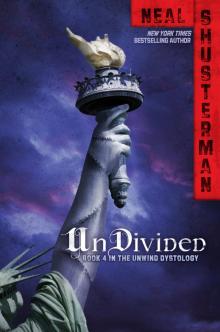 UnDivided
UnDivided UnBound
UnBound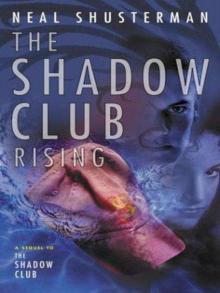 The Shadow Club Rising
The Shadow Club Rising Scorpion Shards
Scorpion Shards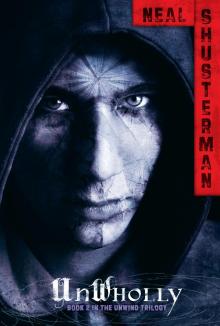 UnWholly
UnWholly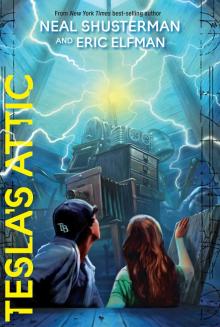 Tesla's Attic
Tesla's Attic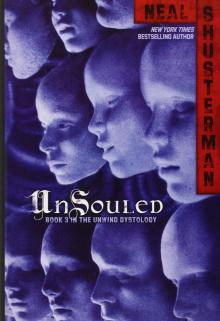 UnSouled
UnSouled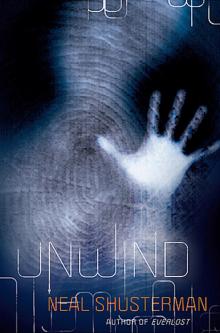 Unwind
Unwind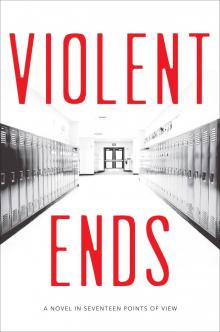 Violent Ends
Violent Ends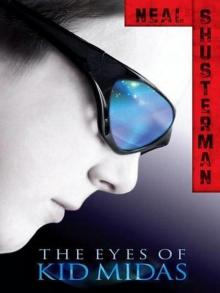 The Eyes of Kid Midas
The Eyes of Kid Midas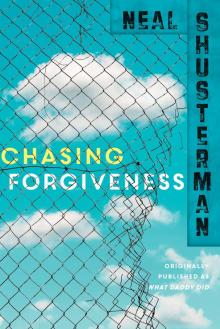 Chasing Forgiveness
Chasing Forgiveness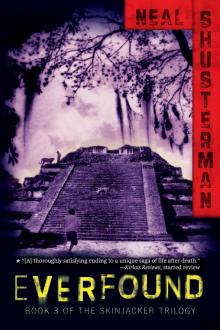 Everfound
Everfound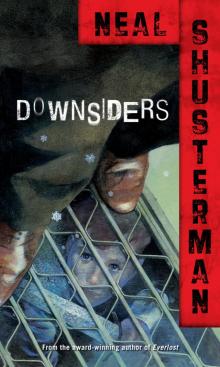 Downsiders
Downsiders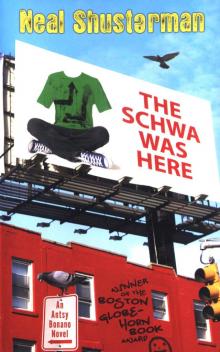 The Schwa Was Here
The Schwa Was Here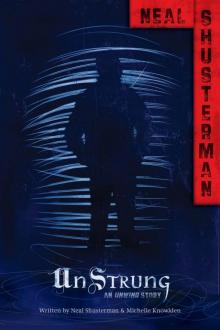 UnStrung
UnStrung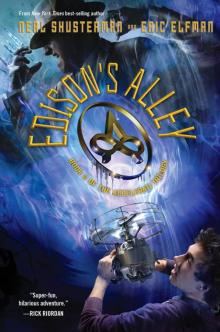 Edison's Alley
Edison's Alley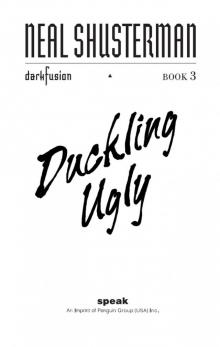 Duckling Ugly
Duckling Ugly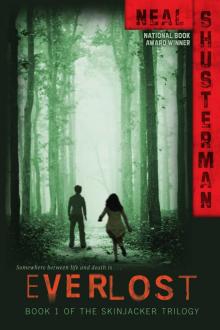 Everlost
Everlost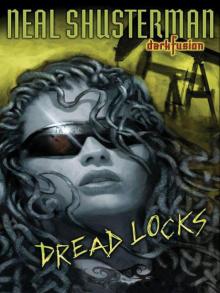 Dread Locks
Dread Locks Antsy Floats
Antsy Floats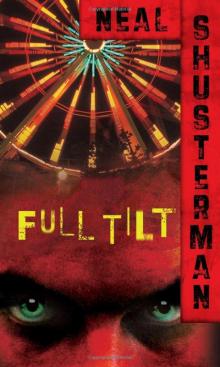 Full Tilt
Full Tilt Thunderhead
Thunderhead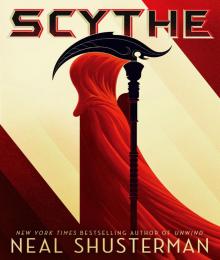 Scythe
Scythe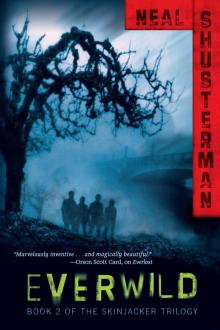 Everwild
Everwild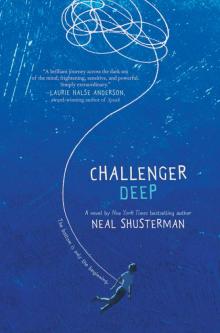 Challenger Deep
Challenger Deep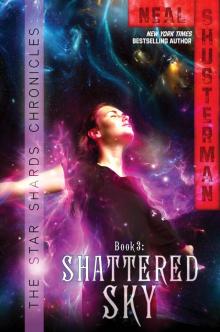 Shattered Sky
Shattered Sky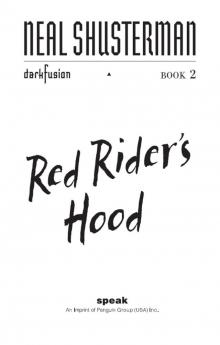 Red Rider's Hood
Red Rider's Hood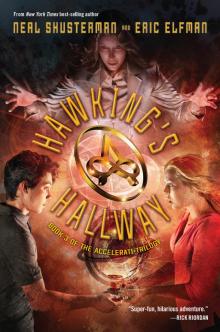 Hawking's Hallway
Hawking's Hallway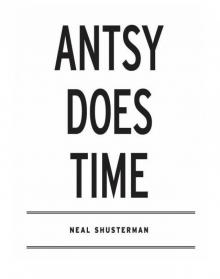 Antsy Does Time
Antsy Does Time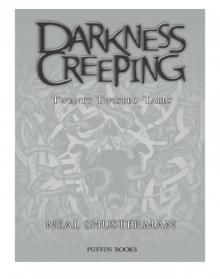 Darkness Creeping: Twenty Twisted Tales
Darkness Creeping: Twenty Twisted Tales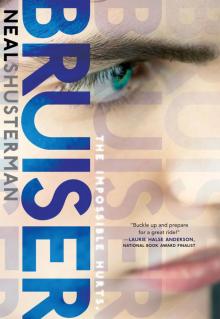 Bruiser
Bruiser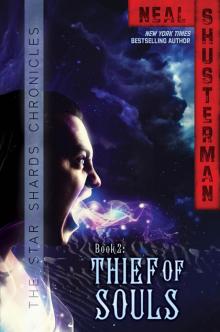 Thief of Souls
Thief of Souls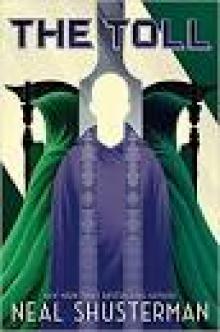 The Toll
The Toll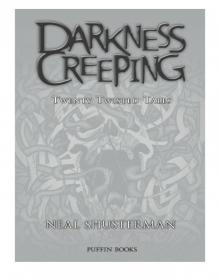 Darkness Creeping
Darkness Creeping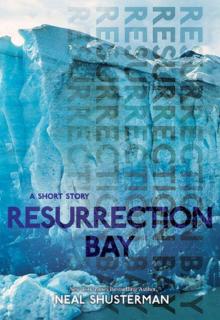 Resurrection Bay
Resurrection Bay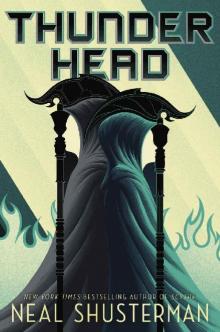 Thunderhead (Arc of a Scythe Book 2)
Thunderhead (Arc of a Scythe Book 2)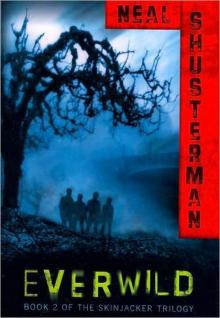 Everwild (The Skinjacker Trilogy)
Everwild (The Skinjacker Trilogy)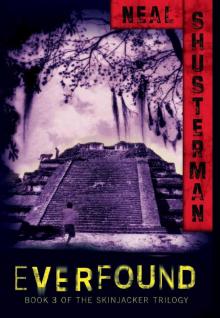 Everfound s-3
Everfound s-3 Edison’s Alley
Edison’s Alley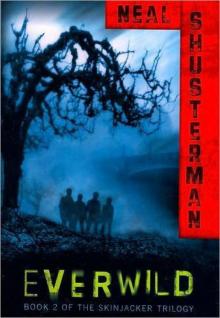 Everwild s-2
Everwild s-2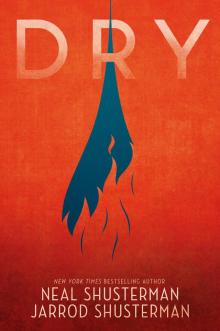 Dry
Dry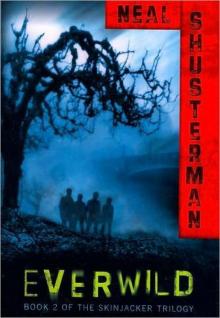 Skinjacker 02 Everwild
Skinjacker 02 Everwild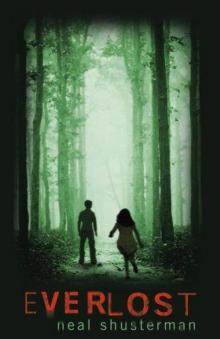 Everlost s-1
Everlost s-1